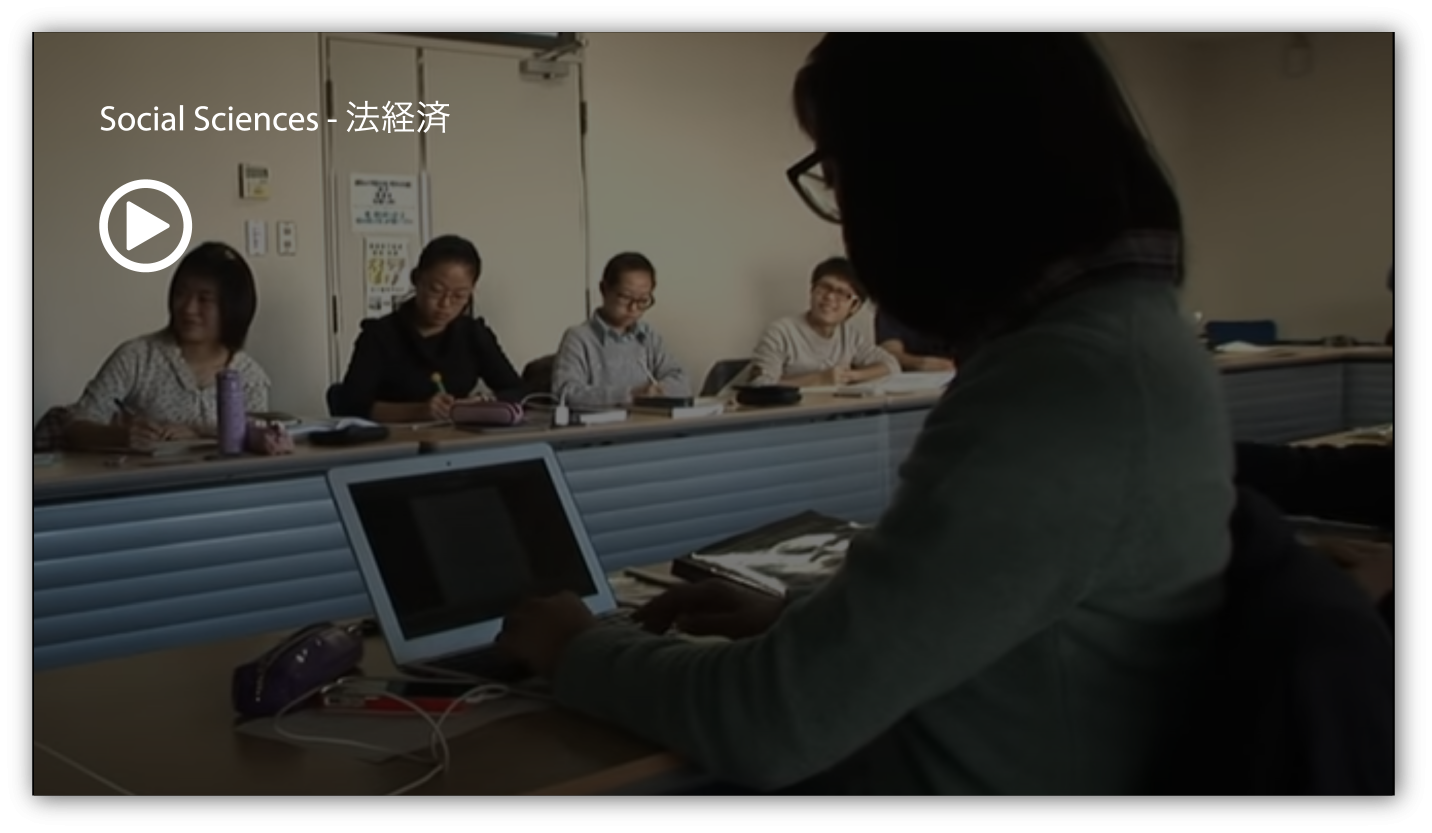Program in Social Sciences
Program Overview
AWARD
LL B. (School of Law)
B.Ec. (School of Economics)
DURATION
4Y
SCHOOL(S)
School of Law
School of Economics
Focus of Study
The program emphasizes the study of Japanese political, legal, and economic systems, in particular:
- School of Law – Law, Political Science
- School of Economics – Economics, Business Administration

The Program in Social Sciences is jointly offered by the School of Law and the School of Economics, in cooperation with the School of Informatics and Sciences. It includes fundamental disciplines in political science, law, economics, business administration, and information science. Students are expected to acquire analytical skills, critical thinking skills and a high ethical awareness, which are needed for the pursuit of knowledge across disciplines. Upon selection of their major, students receive specific guidance from professors in their chosen discipline and are expected to conduct research for their individual graduation thesis under the supervision of their school’s professors.
We promote the undergraduate program with the keywords “globalization” and ”manufacturing”. Additionally, we conduct theoretical studies on Economics and management from introductory to advanced level. We also provide classes in the history of social thought. Our aim, through the curriculum, is to equip the world with universal intelligence.
School of Law
SCHOOL-SPECIFIC FEATURES
The School of Law is staffed by researchers with a broad base of expertise in both Japanese and foreign legal and political systems. The politics courses offered in the G30 program cover general political theory, Japanese politics, comparative politics with a focus on Asia, and international relations. Law subjects cover general legal principles, the Japanese constitutional and legal system, comparative law, and essential features of international law. Economics courses are also open to students enrolled in the Law and Politics program.
Class sizes are small, and seminars are featured in all four years of the curriculum. Students have the option of culminating their studies with submission of a graduation thesis in their final year.
STRENGTHS AND UNIQUENESS

The undergraduate program at Nagoya University’s School of Law is one of the few undergraduate legal and political science programs offered in Japan exclusively in English. It is ideal for students interested in considering legal and political issues from the international perspective. As the world becomes increasingly globalized it is a necessity to take points of difference and commonality into account, where a broad and multifaceted perspective can provide considerable insight to world legal and political issues. Bridging Japan, Asia and the West, Nagoya University’s program gives students the opportunity to study both legal and political topics in detail, helping students to forge their future paths in the region and beyond. Nagoya University is one of Japan’s most prestigious institutions, with a diverse faculty and hosting students from all over the world. The educational experience is truly cosmopolitan, one where a wide range of perspectives and views are presented and where students can receive considerable attention as they embark on the next step of their academic careers.
Studying law at Nagoya University
The undergraduate law program at Nagoya University allows you to study a variety of topics which include:
You will be able to understand law in its social and international contests while exploring its interdisciplinary relationship with economy, social policy, and geopolitics.
– Politics
– Diplomacy
– Civil Law
– The Constitution
– Public Administration
– International Negotiation
– Asian Politics
– Comparative Studies in Law
– Corporate Legal Practices
YOUR FUTURE CAREER
Alumni of the School of Law at large have pursued careers in national and local government, international institutions, NGOs, law firms, and private companies both in Japan and abroad. The School’s profile in legal assistance is widely recognized, and graduates often cross paths in this sphere. Applicants should note that the Bachelor of Laws (LL.B.) awarded to graduates of both the G30 program and the Japanese-taught undergraduate curriculum is a general humanities degree. Professional qualification in Japan is founded on a separate postgraduate Law School program leading to the LL.M. degree. Graduates of the G30 program may apply for admission to any of the several postgraduate programs taught in English or in Japanese in the Graduate School of Law.
School of Economics
SCHOOL-SPECIFIC FEATURES
The undergraduate program in the School of Economics is designed to provide students with a comprehensive understanding of the complex fields of economics and business. The program prepares students to confront real-world problems and exploit opportunities in an increasingly interdependent, globalizing society. The School of Economics offers a wide range of courses and seminars in economics and management, from introductory to advanced levels, and also provides classes in the history of social thought. Class sizes are typically small, encouraging focused discussion. Our aim is to equip students with the knowledge and skills needed to make a significant and positive impact in their chosen careers.
STRENGTHS AND UNIQUENESS

The Economics program attracts highly motivated and excellent students from various countries and regions around the world every year. Students are very proactive, actively engaging in discussions during class and participating in extracurricular activities. The program promotes positive social interactions among students, with seniors and instructors, fostering personal growth of each member. Early goal setting, coupled with actively engaged in company visits, internships, and good Japanese speaking skills, helps students further explore career options in Japan as well as in their home countries. The program is also ideal for those planning to pursue graduate studies in economics and management, providing a comprehensive scope to explore their interests deeply. Graduates have advanced to top graduate schools like London School of Economics and Political Science, McGill University, the University of Chicago, the University of Sydney, and the University of Amsterdam. Spending four years in such an enriched environment, surrounded by like-minded people from diverse backgrounds, significantly benefits their future careers.
Studying economics at Nagoya University
In the Economics and Business Administration major, students participate in an Introductory Seminar in addition to the First Year Seminar. From the 3rd year onward they attend specialized seminars, where they are required to determine assignments on their own and analyze them. They can also participate in special seminars held in Japanese and conduct research with Japanese students.
– Microeconomics
– Macroeconomics
– Business Administration
– Econometrics
– Finance
– Accounting
– Economic Integration
– Development Economics
– Business Internship
Student Testimony

Student Voice
– What made you interested in the Social Sciences – School of Economics program?
Based on my understanding this is the only good public uni that offers English taught Econ program in Japan. If financial condition is a consideration for the student, I believe Nagoya provides an affordable Econ program.
– Why Japan/Nagoya?
I choose Japan because it has a very different culture compared to other Western countries. The tuition fee is relatively low, the language is easy to learn and use as a Chinese, and it’s getting easier for foreigners to stay in Japan after graduating.
– Message to future students
Since the Social Sciences Program is offered jointly by the School of Law and School of Economics, it’s very likely that you need to also take courses related to law and politics. If you have strong interest in these two fields as well, Nagoya Uni may be a good choice for you.
What courses did you take in High School?
AP Microeconomics, AP Macroeconomics, AP Statistics, AP Calculus AB, AP Psychology, AP Computer Science A
Sample Publications by Faculty
- Efficient methods for CSR (Corporate Social Responsibility) for developing countries
- Survival strategy of subcontractors in the automobile industry
- Female workers and childbirth/child-raising
- Effects on employment through deepening of the European Economic Integration

